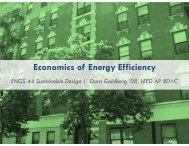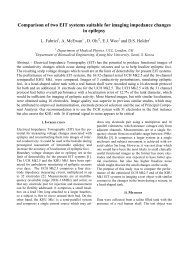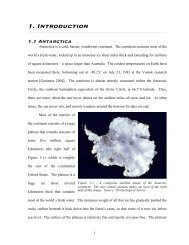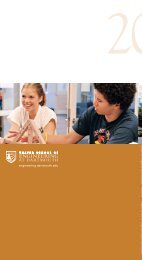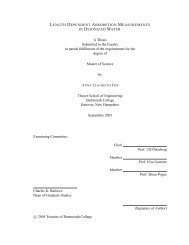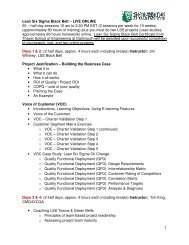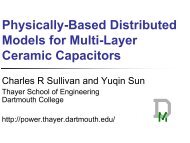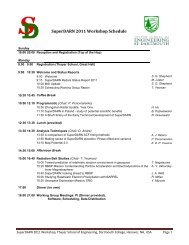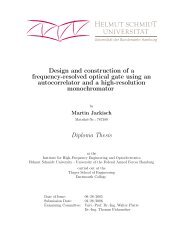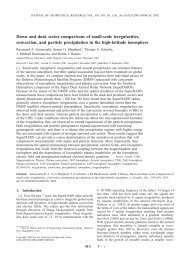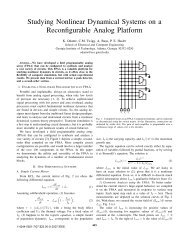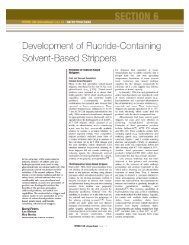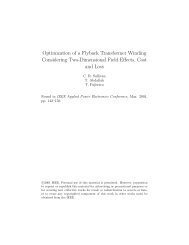Courses Programs - Thayer School of Engineering - Dartmouth ...
Courses Programs - Thayer School of Engineering - Dartmouth ...
Courses Programs - Thayer School of Engineering - Dartmouth ...
Create successful ePaper yourself
Turn your PDF publications into a flip-book with our unique Google optimized e-Paper software.
graduate courses<br />
102<br />
ENGS 167 Medical Imaging<br />
Offered alternate years: 10F: 10<br />
A comprehensive introduction to all major aspects <strong>of</strong> standard medical imaging<br />
systems used today. Topics include radiation, dosimetry, x-ray imaging, computed<br />
tomography, nuclear medicine, MRI, ultrasound, and imaging applications in therapy.<br />
The fundamental mathematics underlying each imaging modality is reviewed and an<br />
engineering picture <strong>of</strong> the hardware needed to implement each system is examined.<br />
The course will incorporate a journal club review <strong>of</strong> research papers, term tests, and a<br />
term project to be completed on an imaging system.<br />
Prerequisite: ENGS 23 or equivalent<br />
Instructor: Pogue<br />
ENGG 168 Biomedical Radiation Transport<br />
Offered alternate years: 11F: 10<br />
This course will provide a general overview <strong>of</strong> radiation transport mechanisms in<br />
matter, beginning with a derivation <strong>of</strong> the Boltzmann radiation transport equation,<br />
and examining the various approximations possible. Focus on the single-energy<br />
Diffusion approximation will be examined in detail, as it relates to neutron diffusion<br />
nuclear reactors and optical photon diffusion. Review <strong>of</strong> photon diffusion in tissue<br />
will be discussed as it relates to tissue spectroscopy and imaging. Fundamental<br />
research papers in this field will be presented and reviewed, covering aspects <strong>of</strong><br />
multiple scattering, Mie scattering, and scattering phase functions. Stochastic modelbased<br />
approaches will be covered as well, such as the Monte Carlo model. Numerical<br />
approaches to solving these models will be introduced.<br />
Prerequisite: ENGS 23 or equivalent<br />
Instructor: Pogue<br />
ENGS 169 Intermediate Biomedical <strong>Engineering</strong><br />
Offered: 11S: 2<br />
A graduate section <strong>of</strong> ENGS 57. Students taking the course for graduate credit will be<br />
expected to write a research proposal aimed at developing a specific surgical technology.<br />
Groups <strong>of</strong> 2-3 students will work together. The proposal will require an extensive<br />
literature review, a detailed proposal <strong>of</strong> research activities, alternative methods, and<br />
timeline, and a detailed budget and budget justification for meeting the research<br />
objectives. Weekly meetings will take place between the groups and Pr<strong>of</strong>essor Halter<br />
to discuss progress. By the end <strong>of</strong> the term the groups are expected to have a complete<br />
proposal drafted. Enrollment is limited to 18 students. Not open to students who<br />
have taken ENGS 57.<br />
Prerequisites: ENGS 23 and ENGS 56 or equivalent<br />
Instructor: Halter<br />
ENGS 171 Industrial Ecology<br />
Offered: 11S, 12S: 2<br />
By studying the flow <strong>of</strong> materials and energy through industrial systems, industrial<br />
ecology identifies economic ways to lessen negative environmental impacts, chiefly<br />
by reducing pollution at the source, minimizing energy consumption, designing for<br />
the environment, and promoting sustainability. The objective <strong>of</strong> this course is to<br />
examine to what extent environmental concerns have already affected specific<br />
industries, and where additional progress can be made. With the emphasis on<br />
technology as a source <strong>of</strong> both problems and solutions, a broad spectrum <strong>of</strong> industrial<br />
activities is reviewed ranging from low-design high-volume to high-design lowvolume<br />
products.<br />
Student activities include a critical review <strong>of</strong> current literature, participation in<br />
class discussion, and a term project in design for the environment.<br />
Prerequisites: ENGS 21 and ENGS 37<br />
Instructor: Cushman-Roisin



